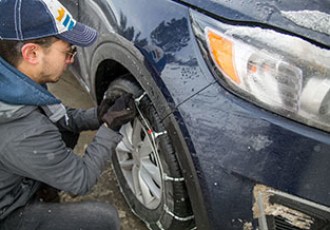BestReviews is reader-supported and may earn an affiliate commission. Details
We recommend these products based on an intensive research process that's designed to cut through the noise and find the top products in this space. Guided by experts, we spend hours looking into the factors that matter, to bring you these selections.

Ready to buy now? Shop the best:
For those with an electric vehicle, having a home EV charger is one of the smartest and most convenient upgrades you can make. Whether you’ve been driving electric for years or you’re just starting out, figuring out which charger to buy can feel a little daunting. The good news? We’re here to make it simple.
This guide breaks down everything you need to know before installing a residential EV charger, like our top pick, the EVIQO Level 2 EV Charger. From making sure it works with your vehicle to understanding charging speeds, installation requirements, safety standards and smart features, you’ll get a clear picture of what really matters.
Compatibility: Compatible with Chevy, Ford, Hyundai, Kia and works as a level 2 ev charger Tesla with adapter (not included). | Power Output: Up to 48A (11.5 kW) for hardwired installation on a 60A circuit; 40A (9.6 kW) with NEMA 14-50 plug. | Special Features: Smart Wi-Fi & App Control, long 25-foot cable
The EVIQO Level 2 EV Charger is simple to install and takes just five minutes, so no electrician is needed. Its weather-resistant design and safety certifications provide reliability in all kinds of weather.
You can monitor usage and adjust charging schedules using the clever Wi-Fi & App control. Most users like the practical 25-foot cable and the fast charging speed, but its incompatibility with a GM EV, durability issues and inability to function without the internet have been brought up by several.
Overall, this charger is a solid choice for something efficient and reliable. Plus, it's backed by a three-year manufacturer warranty for extra peace of mind.
Compatibility: Compatible with all EVs and PHEVs sold in North America | Power Output: Adjustable maximum current output: 40A, 32A, 24A, 16A; Wattage: 10 KW | Special Features: Fast charging, self-monitoring and recovery, easily detachable and portable
The Grizzl-E Classic Level 2 Electric Vehicle (EV) Charger is built tough. On top of that, it’s fast, it’s reliable, and the installation is refreshingly straightforward.
While the design is on the heavier side, you can still easily move it from place to place. That said, the Wi-Fi functionality can be difficult to set up. A few also noted concerns with overheating.
Still, if you’re looking for a rugged charger that balances speed, value, and portability, this is worth a look. It's suitable for cold-weather conditions and has a durable 24-foot charging cable.
Compatibility: J1772 model is universally compatible (adapter required for Teslas) | Power Output: Up to 80 Amps / 240 Volts (AC) | Special Features: Can charge up to 9 times faster than a standard 110V outlet, User-friendly Mobile App
The ChargePoint HomeFlex Level 2 EV Charger charges up to nine times faster than a standard 110-volt outlet, and it comes with a cold-resistant cable, ensuring it works reliably regardless of the weather.
The user-friendly app allows you to manage charging sessions, connect to smart home devices, and even locate nearby charging stations. Though some users have brought up concerns about quality control, most are satisfied with its performance.
If you're looking for something fast and reliable, this is a great choice to keep your car charged and ready.
Compatibility: NACS | Charging Speed: Up to 44 mi of range added per hour at 11.5kW / 48 amp output | Special Features: Wi-Fi enabled with over-the-air updates, Customizable amperage settings up to 48A, Tesla app integration
The Tesla Level 2 EV Charger can add up to 44 miles of range per hour. Its Wi-Fi connectivity and over-the-air updates let you easily manage charging schedules from your app.
You'll need a professional to install it, and its price is on the higher side. Still, its straightforward operation and smart features make it a strong choice for anyone looking for a dependable charger for their Tesla.
Compatibility: J1772 model is universally compatible (adapter required for Teslas) | Power Output: 240V, 40 Amps | Special Features: Dual Charging Plugs, Portable and lightweight with a 16 ft cable
The Lectron Level 1 EV Charger comes with dual charging plugs, making it easy to switch between standard and high-power outlets.
Many folks appreciate its heavy-duty connector and weather-resistant build, but, it's worth mentioning that there are a few malfunctions mentioned online.
Still, if you want a convenient way to keep your vehicle charged, this one is a solid choice. Plus, it comes with a one-year warranty.
Before you start shopping, the first step is making sure the charger will actually work with your vehicle. It sounds obvious, but it's an easy step to skip.
After compatibility, the next big question is: how fast do you want to charge? This comes down to power output and your home’s electrical capacity.
Compatibility and speed matter, but none of it works without proper installation.
Get emails you’ll love.
Learn about the products you’re wondering if you should buy and get advice on using your latest purchases.
